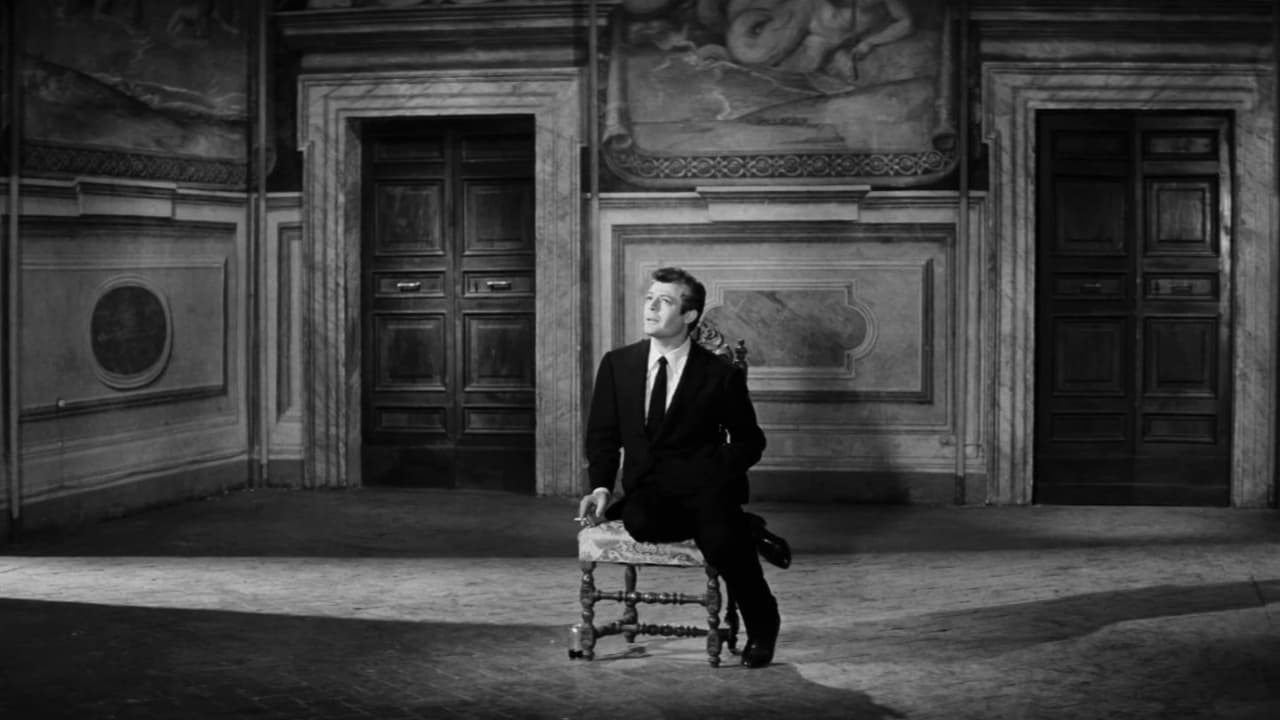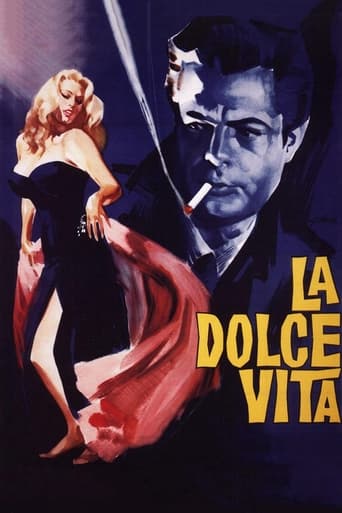SincereFinest
disgusting, overrated, pointless
Dorathen
Better Late Then Never
Afouotos
Although it has its amusing moments, in eneral the plot does not convince.
Arianna Moses
Let me be very fair here, this is not the best movie in my opinion. But, this movie is fun, it has purpose and is very enjoyable to watch.
martindonovanitaly
Great artists are like prophets whether they mean it or not. Think of H G Wells and Ray Bradbury or Paddy Chayesfski for that matter. Here Federico Fellini warns us about the disenchantment of plenty. So, at the end, this scandalous film of 1960 is a morality tale. Marcello Mastroianni is superb, a beautiful exterior with an interior that is dying, slowly but surely. The term "paparazzo" was coined in this film. The hunters of the banal grew in numbers over the years but not in scope,
Anita Ekberg became a symbol of the sixties and who was she? A fantasy, impossible to reach. Real is his wife, the splendid Yvonne Fourneaux. Real is his father, played with heart breaking resignation by Annibale Ninchi or the suicide of his close friend, the intellectual played by Alain Cuny. La Dolce Vita is almost 58 years old and I imagine that the its message, like in most art, will live forever.
Thuani
Classic of the Classics! Fellini masterfully portrays the post-war Italian high society: full of misunderstandings, dirty and empty world! In addition to criticizing the world of journalists, meaningless, and nominate the celebrity photographers, the paparazzi! A Tough life, nothing Sweet !!
peefyn
Sadly my viewing of this ended up being divided over three different watching sessions, neither of them intentional. This is a long movie, and at times you can feel it, but it never stops paying of. It's structure, being divided into "days"/events, lends for it being easy to watch and follow. Some of the parts are more memorable than others (my favorite was the prophet), but they're all beautifully shot, and they all seem to follow some similar thematic lines.You follow the lifestyle of the rich and famous, and obviously it's not all good. But at the same time, it's not all bad, either. It's the life that these people live, and many of them want. But what their lives actually look like, depends on who is looking. And the lifestyle the live is not separate to the fact that they are being observed. At least these were the thoughts I got on my first watch through, though they might be influenced by the way the society has developed since this movie came out.
elvircorhodzic
LA DOLCE VITA is a comedy drama, which, in a surreal and grotesque way, shows a tragicomic deterioration of high society in Rome.The main protagonist is a journalist who wants to become a writer. He writes trivial stories about carousing in high society for a tabloid. His job is to attend each party or important event. However, actresses, artists, starlets and easy life are very appealing to the journalist who, in that frenzy, is trying to find a meaning, love and happiness...Mr. Fellini has, through sharp contrasts and contradictions, showed senselessness of life. That apparent freedom, which includes hedonistic behavior, prostitution and promiscuity is actually a vaguely wandering without a purpose. The protagonists have, in a strange way, Alienated themselves from reality. They enjoy the "sweet life", but they do not understand it.Mr. Fellini, in an ironic way, shows, through unusual incidents, all the superficiality of one layer of society. However, he is not making fun of a frustrated, unfulfilled and unhappy group of people. He has actually replaced dignity with sensationalism. It is a sad view of decadence of one man and his environment. Fellini's world is really crazy, no less crazy than ours, but it is empty. An irregular mosaic structure was arranged in a meaningful and sad whole.The protagonists are lost and do not understand each other.Marcello Rubini (Marcello Mastroianni) is simply brilliant as a journalist, who goes through crazy experiences, while examines important questions of life. Emma (Yvonne Furneau) as his fiancée is, perhaps a true hero in this story, regardless of the pretty powerful bourgeois tone in her character. Steiner (Alain Cuny) is an artist, writer, poet and musician. He is everything that Marcello wants to be. However, Steiner was, despite the wonderful family, tired of life.Anita Ekberg as Sylvia is a big movie star. Marcello is, from the first moment, in love with her. She is a singing and dancing lady, who slowly, like a dream at dawn, escapes from him. Walter Santesso as Paparazzo is "it" in the true sense of that word.The logic is definitely a little "moved" in this film. However, the point is crystal clear.

